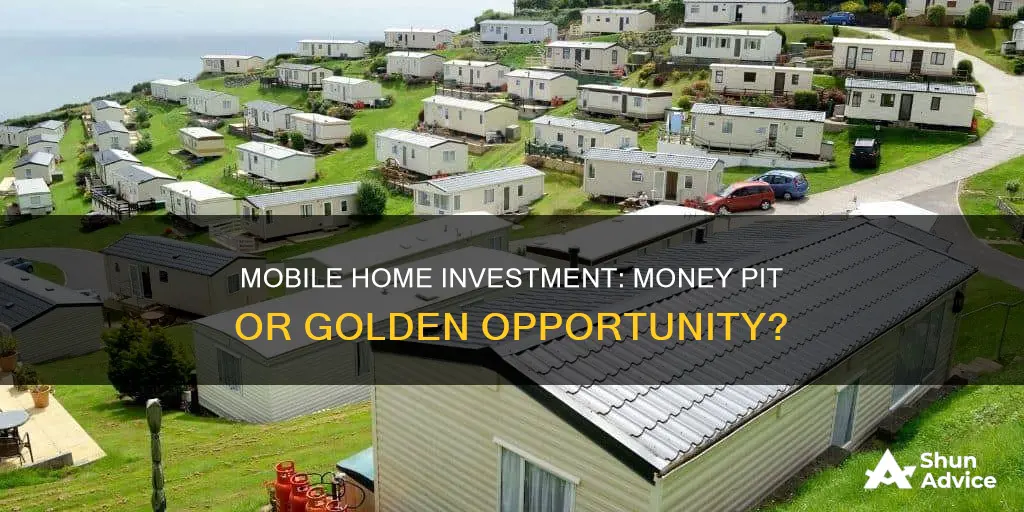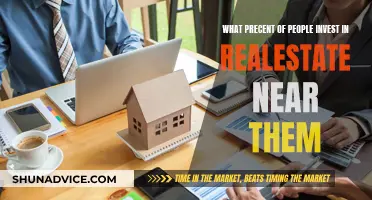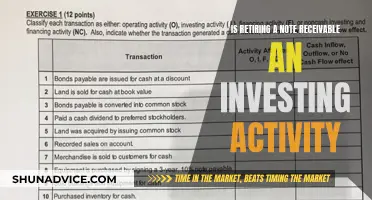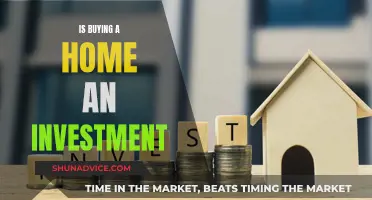
Mobile homes are generally considered a bad investment because they tend to depreciate in value over time. They are often compared to cars in this respect, with their value decreasing as soon as they are purchased. This means that, in the long run, they are a poor investment choice.
However, mobile homes are more affordable than traditional houses, and can be a good option for those looking for a place to live, rather than an investment opportunity. They are also attractive to investors due to their low upfront costs and potential for quick returns.
There are several factors to consider when deciding whether to invest in a mobile home, including the location, the cost of renting a space, and long-term financial goals.
What You'll Learn

Mobile homes are depreciating assets
Mobile homes are often considered depreciating assets. This is because they are not permanently fixed to a foundation and are therefore not considered "real estate". Instead, they are more akin to automobiles, which lose value over time.
However, this is not always the case. The value of a mobile home, like any other piece of real estate, is dependent on a variety of factors, including location, condition, and demand. If a mobile home is well-maintained and located in a desirable area, it can appreciate in value over time.
For example, according to lendingtree.com, the median value of mobile homes increased by 39% from 2014 to 2019, outpacing the 33% increase in the median value of single-family homes during the same period. Additionally, the average price of a used manufactured/mobile home sold in 2021 was $51,133, a 71% increase from the average price of $29,964 in 2008.
The location of a mobile home is a key consideration in its value. Mobile homes located in trailer parks may depreciate in value over time, while those built on owned land may appreciate. The quality of local schools, employment opportunities, proximity to shopping and transportation, and noise levels can also impact the value of a mobile home over time.
Proper maintenance is also essential to preserving the value of a mobile home. Regular maintenance checks, such as clearing gutters and spouts, changing air filters, and inspecting windows for proper sealing, can help prevent water damage, heating and cooling issues, and pest infestations, all of which can decrease the resale value of the home.
While mobile homes may not be considered traditional real estate investments, they can still be a good option for those looking for affordable housing or investment opportunities. They are significantly more affordable than traditional single-family homes and have lower maintenance costs due to their smaller size and less complex systems. Additionally, there is a reliable demand for mobile homes, with 22 million Americans currently living in them and 90% of people reporting satisfaction with their mobile homes.
State Retirement: Cash or Invest?
You may want to see also

They are more vulnerable to natural disasters
Mobile homes are more vulnerable to natural disasters than traditional homes. They are less sturdy and more susceptible to damage or complete devastation during natural disasters. Earthquakes, tornadoes, hurricanes, and floods can all wreak havoc on mobile homes. People who live in mobile homes are 15 to 20 times more likely to be killed during a tornado than those in traditional homes, according to the National Weather Service.
The vulnerability of mobile homes to natural disasters is partly due to their construction. Mobile homes are typically made of wood and metal, just like standard homes, but they are not usually built on a permanent foundation with framing designed to last. This makes them more susceptible to wind and water damage, as well as fire.
Additionally, mobile home parks are often built on land that is prone to natural disasters. Many mobile home parks were constructed before the establishment of rules and regulations meant to protect housing from natural hazards. As a result, mobile home parks are often located in areas that are at high risk for floods, wildfires, hurricanes, and other natural disasters.
The impact of natural disasters on mobile homes is also compounded by the social and economic vulnerabilities of their residents. Mobile homes are often affordable housing options for low-income individuals and families, seniors, households with small children, immigrants, and people with disabilities. These groups may have fewer resources to prepare for or recover from disasters.
Furthermore, the complicated ownership arrangements of mobile homes can create barriers to disaster recovery. In many cases, mobile home residents own their homes but rent the land they are on, creating a murky legal situation that can affect their eligibility for disaster recovery programs and insurance coverage.
Overall, the combination of structural vulnerabilities, location in high-risk areas, and social and economic factors makes mobile homes more vulnerable to natural disasters.
The Workforce Investment Act: Funding America's Future
You may want to see also

They are more difficult to resell
Mobile homes are difficult to resell because they are not typically considered "real estate". If you don't own the land that your mobile home is on, it's considered "chattel" or personal property. This makes the sales process more complex.
In this case, you can't sell your mobile home without involving the mobile home park owner, who has the "first right of refusal" or the "right to first refusal". This means that the park owner can buy your mobile home if they match the offer of another buyer, allowing them to maintain control over who lives in the park. The park owner also has the right to approve or veto your potential buyer, further complicating the process.
Additionally, mobile homes are not very mobile. Once placed in a mobile home park and hooked up to utilities, they are difficult and costly to move, often costing thousands of dollars. This makes it challenging to find a buyer who is willing to commit to living in the same mobile home park.
The stigma surrounding mobile homes also contributes to the difficulty in reselling them. Despite improvements in design and technology, some people still associate mobile homes with the classic, self-contained, shoebox-shaped houses typically seen in trailer parks. This perception can impact the value of mobile homes and make them less desirable to potential buyers.
Finally, mobile homes tend to drop in value over time, which can make it challenging to resell them at a profit. They are more comparable to buying a new car, which loses value as soon as you drive it off the lot. This depreciation can be a significant financial disadvantage, especially if you have borrowed money to purchase the mobile home.
Will Brockett: Unveiling Cambridge Associates' Investment Strategies
You may want to see also

They have higher maintenance costs
Mobile homes are generally considered a bad investment because they lose value over time. They are more comparable to buying a car than buying real estate. While they may be more affordable than traditional homes, they are not a good long-term investment.
One of the reasons for this is that mobile homes have higher maintenance costs. When you own a mobile home, you are responsible for all maintenance and repairs. This includes the cost of mowing the lawn, roof repairs, foundation issues, plumbing problems, and electrical faults.
To keep maintenance costs down, preventative measures can be taken. For example, it is recommended that you check your home's foundation for cracks and imbalances at least once a year. You should also check your skirting for cracks or holes that could allow pests or moisture to enter your home. Checking your roof twice a year for cracks, missing shingles, or debris is another way to prevent issues.
Additionally, it is important to keep your gutters and siding clean. Clogged gutters can lead to leaks, water damage, and mildew, while dirty siding can be a breeding ground for mildew and mold. Cleaning your air filters twice a year and having the ducts vacuumed annually will also help to maintain your mobile home and keep costs down.
While mobile homes may be cheaper than traditional houses, they still require regular maintenance and repairs, which can be costly. Therefore, it is advisable to set aside a budget for these expenses and be prepared for unexpected costs.
The Intricacies of Direct Investment: Unraveling the Majority Share Purchase
You may want to see also

They are harder to finance
Mobile homes are harder to finance than traditional homes. This is because most lenders do not consider mobile homes to be real property, instead classifying them as personal property. This distinction eliminates the option of getting a mortgage to buy a mobile home.
However, there are still some ways to finance a mobile home. One option is to take out a personal loan. Personal loans do not require the home to secure them, so even if you fall behind on payments, the lender cannot foreclose on your home. Personal loans also have fewer associated fees than mortgages, and approval and fund disbursement tend to happen faster. However, personal loans typically have higher interest rates than mortgages, and banks often have loan limits of around $50,000, which may not be enough to cover the cost of a mobile home.
Another option is a chattel loan, which is a type of personal property loan designed for financing expensive vehicles like planes, boats, and farm equipment. Chattel loans are secured by the financed property, which can be repossessed in the case of default. Chattel loans tend to have higher interest rates than traditional mortgages, shorter repayment periods, and lower maximum loan amounts. However, they may be a good option for buyers who plan to rent a lot in a mobile home community, as they do not require the borrower to own the land.
A third option is a conventional loan from Freddie Mac or Fannie Mae. These loans are only available for manufactured homes (built after 1976) that meet certain requirements, such as having a permanent foundation and a minimum amount of living space. Freddie Mac and Fannie Mae loans typically require a down payment of 5% and can be fixed-rate or adjustable-rate mortgages.
Finally, for qualifying service members or veterans of the U.S. Armed Forces, a VA loan may be an option. VA loans offer many advantages, including no down payment requirement, low-interest rates, and no private mortgage insurance requirement. However, they typically require that the manufactured home be placed on land that the buyer owns.
While there are financing options available for mobile homes, they may be harder to obtain than traditional mortgages due to the classification of mobile homes as personal property. It is important to carefully consider the pros and cons of each financing option before making a decision.
Caribbean Citizenship: Investing in a Tropical Paradise
You may want to see also
Frequently asked questions
Mobile homes are generally not considered a good investment as they depreciate in value over time.
Mobile homes are more affordable than traditional houses, which makes them attractive to budget-conscious investors. They also offer quick returns, lower maintenance costs, and stable demand.
Mobile homes can be difficult to resell, may have higher interest rates on loans, and are vulnerable to natural disasters. They are also subject to park regulations and zoning restrictions, which can impact their value.
Traditional homes typically increase in value over time, whereas mobile homes tend to depreciate. Land also appreciates in value, so if you own land and build a traditional home or place a mobile home on it, the value will usually increase.
Yes, there are other options for investing in real estate, such as buying a traditional house or investing in mutual funds.







